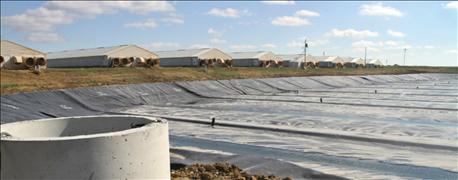
Renewable natural gas will be pumping into the nation's grid from hog finishing barns in Missouri. St. Louis-based Roeslein Alternative Energy says its next phase of turning manure to energy will be operational by mid-2016.
Manure produce by hogs on the Ruckman Farm, one of Smithfield Foods nine hog production facilities in northern Missouri, will be made into renewable energy. In total, Roeslein Alternative Energy will be harness the gas from manure produced by 2 million pigs.

MANURE TO ENERGY: An impermeable cover at Smithfield Foods Hog Production's Ruckman Farm in Northwest Missouri is part of a $120 million manure-to-energy project. Roeslein Alternative Energy will capture biogas created during the anaerobic digestion of manure from nearly two million hogs annually and begin placing it into a national pipeline in summer 2016. (Photo Credit: Roeslein Alternative Energy)
"The technology we have developed is ready to be deployed commercially in a project that makes both economic sense and environmental sense," Rudi Roeslein, founder and president of Roeslein Alternative Energy said during a press conference at the farm. "This is not just about converting the manure from almost two million pigs into renewable energy. It's about taking environmental sustainability to a new level."
"This project will show how farmers can do more than produce food. We can make energy, we can reduce waste, and we can be good stewards for our most important resources – land and water," added Blake Boxley, Director of Environmental Health and Safety, Smithfield Hog Production.
Construction on the $120 million project began back in 2014. According to company officials, it remains on schedule.
Project schedule
The first phase of the project involves installing impermeable covers and flare systems on 88 existing manure lagoons at Smithfield Foods hog farms in the state is nearing completion.
The covers, according to company representatives, reduce greenhouse gases by preventing methane from escaping to the atmosphere. In addition, the cover keeps rainfall from entering the lagoons and ultimately, reduces odor.
The second phase involves fabricating and installing technology to purify the biogas captured by the impermeable covers and developing an inter-connection to a natural gas pipeline operated by ANR Pipeline Company, which transverses Ruckman Farm. The Renewable Natural Gas, also known in the energy industry as RNG, is projected to enter the pipeline in the summer of 2016.
Roeslein already has a buyer. Duke Energy in North Carolina agreed to purchase a portion of the RNG to help meet clean energy requirements for power generation.
Project benefits
The company expects hog manure from the project to produce roughly 2.2 billion cubic feet of pipeline quality RNG or the equivalent of 17 million gallons of diesel fuel annually.
According to company officials, the project will prevent about 850,000 tons of CO2 reaching the atmosphere.
The project is bringing new life to hog barns. "Since the partnership with Roeslein, we've been able to re-stock some farms that had been idle." Boxley said. "With their help and their technology, we have since created more than 100 jobs for our grow-finish hog operation in Missouri."
About the Author(s)
You May Also Like






